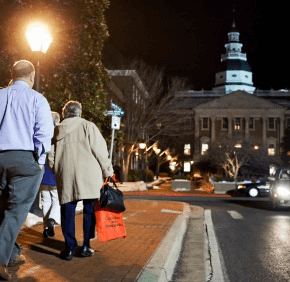ezygmont@CatholicReview.org
Twitter @ReviewErik
The Maryland Catholic Conference, the legislative lobbying arm of the state’s bishops, briefed members of the Catholic press Jan. 6 on what to expect over the 90-day session.
“We’ll continue to make our case that it’s making a difference for a lot of kids across the state,” O’Day said.
According to information provided by the MCC, 2,464 students who qualified for either free or reduced-price meals were awarded $4,769,200 in scholarships for the 2016-17 schoolyear.
BOOST, or Broadening Options and Opportunities for Students Today, was funded within the state’s budget for fiscal year 2017.
“We would try to get it expanded if the governor does put extra money (for BOOST) into the budget,” O’Day said. “We don’t know what any increase would look like or if it is certain to be there.”
Children and parents who have already received scholarships “are counting on this program,” O’Day added, noting it would not make sense to eliminate the help they have received. “We want to at least keep them where they’re at.”
He said the MCC would pay attention to specific issues, including the automatic charging of juveniles as adults in certain situations, “as well as the life without parole issue,” so that “kids who commit crimes under the age of 18 cannot be kept hopelessly for the rest of their lives without any chance.”
“I think, overall, we are looking into these issues as just a step forward from the state’s repealing the death penalty,” said Mary Ellen Russell, executive director of the MCC.
“Numerous statements that come out of the (U.S. Conference of Catholic Bishops) call for our support of these issues,” O’Day said.
The bill passed the House of Delegates in 2016 but did not advance for a vote in the State Senate. This year’s bill, already filed in the house by Del. Luke Clippinger, a Democrat representing parts of Baltimore City, would require those employing 15 or more workers to allow employees to accrue at least one hour of paid sick leave for every 30 hours worked. Those employing 14 or fewer would have to allow those employees to accrue unpaid sick leave.
“As with last year, our goal is to pass the strongest Healthy Working Families Act to affect the most people, so the most people in the state can earn paid sick leave,” Davenport said.
She added the MCC would support strengthening the state’s earned income tax credit, which she called “one of the strongest anti-poverty programs in the country.”
“The average amount of time people utilize the earned income tax credit is three years,” Davenport said, noting that by that time, they have removed their hindrances to contributing to the local economy, having acquired a vehicle, permanent housing or other markers of economic stability.
Among other measures, she said that the MCC would like to see the minimum age for claiming the credit lowered from 25 to 18, “in recognition that there are a lot of younger workers supporting themselves and families.”
Last year, a bill that would have allowed a patient with a terminal diagnosis of six months or less to live to obtain a prescription for a lethal substance was withdrawn from the State Senate Judiciary Proceedings Committee by its sponsor, State Sen. Ronald Young, a Democrat representing parts of Washington and Frederick Counties.
Jennifer Briemann, MCC associate director handling respect for life issues said the conference has every reason to believe a bill will be formally proposed fairly early in the 2017 legislative session..
The office of State Sen. Guy Guzzone, a Democrat representing part of Howard County, told the Catholic Review in December that the senator would sponsor the bill in 2017. Guzzone is known for his advocacy on behalf of people with disabilities; disabilities advocacy organizations have strongly opposed such bills in Maryland in the past.
Briemann noted that Compassion and Choices, an organization that has advocated, in some cases successfully, for physician-assisted suicide in several states and has received major funding from George Soros’ Open Society Foundations, has scheduled a rally for Jan. 25 in Annapolis.
The Catholic Church affirms the dignity of all life, from the moment of conception until natural death.
“Our Christian faith embraces all people, and doesn’t consider anyone a burden,” Russell added.
Also see:


